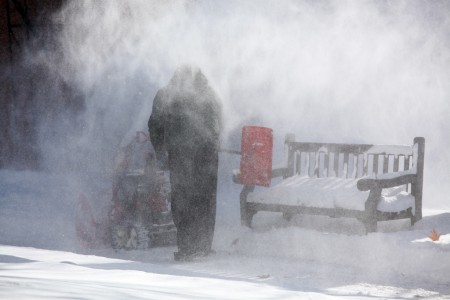
This week’s episode of This American Life features a discussion between Roberta Johnson, the Executive Director of the National Earth Science Teachers Association, and Erin Gustafson, a high school age climate change denier and appreciator of Glenn Beck.
The pattern of the discussion is a familiar one to me. Dr. Johnson lays out the evidence that humans are changing the climate dangerously, based on things like ice core samples and isotopic ratios. Ms. Gustafson brings up some common denier talking points, like the Medieval Warm Period and the leaked climate science emails. Dr. Johnson responds to these criticisms, but Ms. Gustafson remains unconvinced.
The host then asks Dr. Johnson if there is any hope of getting through to people with evidence, once they become skeptical. Her answer is not terribly satisfying, and the whole interview is testimony to the difficulty of the task.
Of course, the word ‘skeptical’ is being misused here. To continue to disagree with a claim, regardless of how weak your arguments are or how strong those backing it have become, is not skepticism. Rather, it is a kind of dogmatism. There are many genuine difficulties in making sense of our complex world, but it seems to me that the modes of thinking about thinking are what are really broken in climate change deniers. They will cling to any scrap of evidence that supports what they want to believe, while subscribing to conspiracy theories that discredit those who argue otherwise.
As I have mentioned before, I was a lot less concerned about climate change a few years ago. I bought the argument from The Economist that we didn’t know whether it would be cheaper to stop or to simply adapt to. Since then, virtually all the new evidence and analysis has given us greater cause for concern. Unfortunately, the last few years have seen a kind of exhaustion among both advocates of action on climate change and society at large. The deniers are winning, at least insofar as they are giving politicians more than enough cover to continue to do far too little about what is probably the world’s most important problem.
People who are concerned about climate change might be wrong. There could be something about the planet we have overlooked, which means humanity’s greenhouse gas emissions don’t need to be curbed. That being said, it seems decreasingly likely that this is the case. More and more lines of evidence demonstrate what is happening and why. There is also the question of risk management. If we believe the deniers and they are wrong, the world is in a lot of trouble. If we believe the activists, move to a zero carbon economy, and then discover the threat was overblown, we will have accomplished a lot of useful things. We will have lost out on a bit of the prosperity that continued use of fossil fuels would have given us, but we would have built a cleaner and sustainable global society. At worst, we would create a better world ‘for nothing.’
* One important exception to this argument concerns extreme poverty. If there is any area where we should let another moral objective trump climate change mitigation, it is in improving the lot of those who are desperately impoverished. Since their emissions are a tiny part of the global total anyhow, this goal can be sought at the same time as the excessive emissions of those in rich countries are aggressively reduced.






